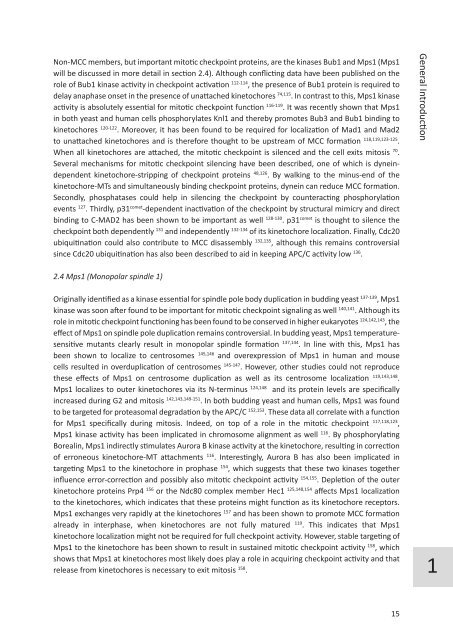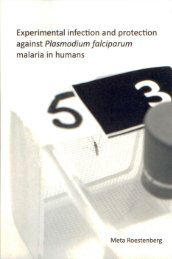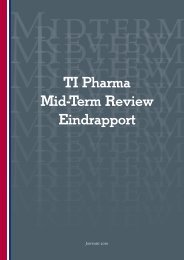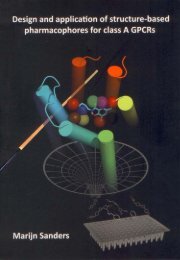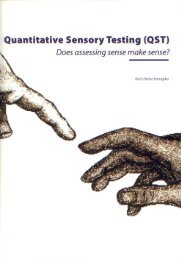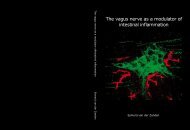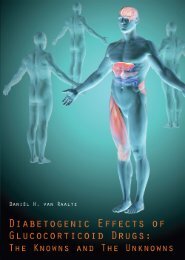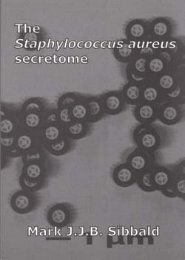Chromosome segregation errors: a double-edged sword - TI Pharma
Chromosome segregation errors: a double-edged sword - TI Pharma
Chromosome segregation errors: a double-edged sword - TI Pharma
You also want an ePaper? Increase the reach of your titles
YUMPU automatically turns print PDFs into web optimized ePapers that Google loves.
Non-MCC members, but important mitotic checkpoint proteins, are the kinases Bub1 and Mps1 (Mps1<br />
will be discussed in more detail in section 2.4). Although conflicting data have been published on the<br />
role of Bub1 kinase activity in checkpoint activation 112-114 , the presence of Bub1 protein is required to<br />
delay anaphase onset in the presence of unattached kinetochores 74,115 . In contrast to this, Mps1 kinase<br />
activity is absolutely essential for mitotic checkpoint function 116-119 . It was recently shown that Mps1<br />
in both yeast and human cells phosphorylates Knl1 and thereby promotes Bub3 and Bub1 binding to<br />
kinetochores 120-122 . Moreover, it has been found to be required for localization of Mad1 and Mad2<br />
to unattached kinetochores and is therefore thought to be upstream of MCC formation 118,119,123-125 .<br />
When all kinetochores are attached, the mitotic checkpoint is silenced and the cell exits mitosis 70 .<br />
Several mechanisms for mitotic checkpoint silencing have been described, one of which is dyneindependent<br />
kinetochore-stripping of checkpoint proteins 48,126 . By walking to the minus-end of the<br />
kinetochore-MTs and simultaneously binding checkpoint proteins, dynein can reduce MCC formation.<br />
Secondly, phosphatases could help in silencing the checkpoint by counteracting phosphorylation<br />
events 127 . Thirdly, p31 comet -dependent inactivation of the checkpoint by structural mimicry and direct<br />
binding to C-MAD2 has been shown to be important as well 128-130 . p31 comet is thought to silence the<br />
checkpoint both dependently 131 and independently 132-134 of its kinetochore localization. Finally, Cdc20<br />
ubiquitination could also contribute to MCC disassembly 132,135 , although this remains controversial<br />
since Cdc20 ubiquitination has also been described to aid in keeping APC/C activity low 136 .<br />
2.4 Mps1 (Monopolar spindle 1)<br />
Originally identified as a kinase essential for spindle pole body duplication in budding yeast 137-139 , Mps1<br />
kinase was soon after found to be important for mitotic checkpoint signaling as well 140,141 . Although its<br />
role in mitotic checkpoint functioning has been found to be conserved in higher eukaryotes 124,142,143 , the<br />
effect of Mps1 on spindle pole duplication remains controversial. In budding yeast, Mps1 temperaturesensitive<br />
mutants clearly result in monopolar spindle formation 137,144 . In line with this, Mps1 has<br />
been shown to localize to centrosomes 145,146 and overexpression of Mps1 in human and mouse<br />
cells resulted in overduplication of centrosomes 145-147 . However, other studies could not reproduce<br />
these effects of Mps1 on centrosome duplication as well as its centrosome localization 119,143,148 .<br />
Mps1 localizes to outer kinetochores via its N-terminus 124,148 and its protein levels are specifically<br />
increased during G2 and mitosis 142,143,149-151 . In both budding yeast and human cells, Mps1 was found<br />
to be targeted for proteasomal degradation by the APC/C 152,153 . These data all correlate with a function<br />
for Mps1 specifically during mitosis. Indeed, on top of a role in the mitotic checkpoint 117,118,123 ,<br />
Mps1 kinase activity has been implicated in chromosome alignment as well 116 . By phosphorylating<br />
Borealin, Mps1 indirectly stimulates Aurora B kinase activity at the kinetochore, resulting in correction<br />
of erroneous kinetochore-MT attachments 116 . Interestingly, Aurora B has also been implicated in<br />
targeting Mps1 to the kinetochore in prophase 154 , which suggests that these two kinases together<br />
influence error-correction and possibly also mitotic checkpoint activity 154,155 . Depletion of the outer<br />
kinetochore proteins Prp4 156 or the Ndc80 complex member Hec1 125,148,154 affects Mps1 localization<br />
to the kinetochores, which indicates that these proteins might function as its kinetochore receptors.<br />
Mps1 exchanges very rapidly at the kinetochores 157 and has been shown to promote MCC formation<br />
already in interphase, when kinetochores are not fully matured 119 . This indicates that Mps1<br />
kinetochore localization might not be required for full checkpoint activity. However, stable targeting of<br />
Mps1 to the kinetochore has been shown to result in sustained mitotic checkpoint activity 158 , which<br />
shows that Mps1 at kinetochores most likely does play a role in acquiring checkpoint activity and that<br />
release from kinetochores is necessary to exit mitosis 158 .<br />
15<br />
General Introduction 1


